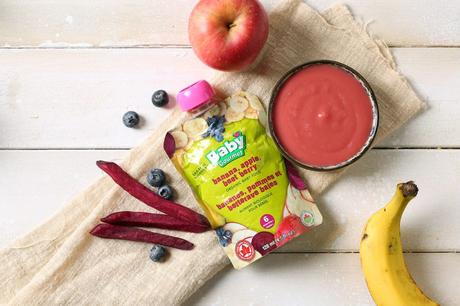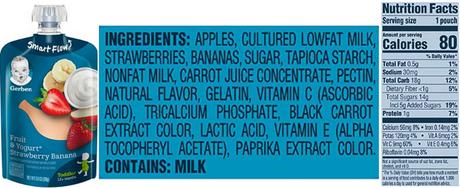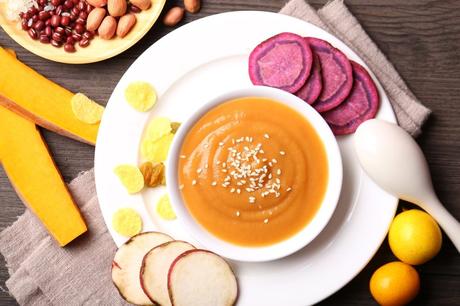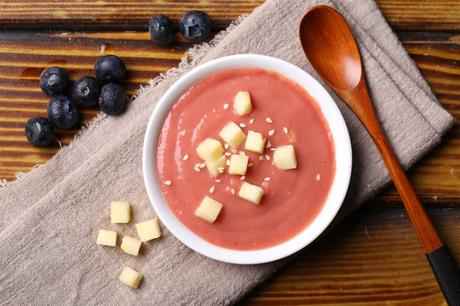When your little one transitions to solids, a common question is: should I buy pre-made baby food pouches or make baby food at home? While it doesn't necessarily have to be an either-or, many of you know that I'm a huge fan of homemade baby food because it's so easy and you can control all of the ingredients your little one is getting. I shared all of the recipes I used for Layla and Ayan in my baby food cookbook and put many on my blog here!
But there are those times when you're on the go, or pressed for time, and you don't have any homemade baby food on hand. Which is when baby food pouches can be a quick and convenient meal for your little one! But there are SO many baby food pouches out there, and not all of them are healthy. Many are filled with processed ingredients and added sugars. This can set your baby up to only appreciate sweet foods and reject vegetables as they get older. So what should you buy? And what should you avoid? This is your guide to the healthiest baby food pouches available today!

So first, can some baby food pouches really be that unhealthy? The food industry knows that babies shouldn't be having added sugars when they first start solids, right?
Wrong.
As you have probably heard when it comes to buying pre-packaged food, what's on the front is often misleading. This is also true when it comes to baby food pouches. The front may say spinach and kale, but when you turn it over you'll find less expensive fillers such as fruit purees, or even fruit juices like apple juice concentrate. Sometimes in a "spinach" pouch the first 3 ingredients are fruits! That's because, while there may be spinach, the manufacturer is not required to list the percentage of ingredients on the label.
This basically means that your baby is only getting a sweet taste when eating that pouch and isn't getting exposed to the actual taste of a vegetable. And in those early months of developing tastebuds, getting exposure to all kinds of flavors and tastes is essential to having a baby who doesn't become a picky eater (who rejects veggies) later on!
But it's so hard, as a parent, to figure out what's healthy and what's not. Ingredient labels are confusing, packaging is misleading. I remember when I first gave Layla a baby food pouch and she devoured it. It was a pouch that said "organic super greens" on it. And I remember thinking: "Yeah! She loves greens!" When I turned it over, the ingredients were: bananas, pear, apple, spinach. What??
It has always really bothered me that most baby food pouches (even the ones promoting veggies) contain fruit. Like why add bananas or pears to a carrot & sweet potato pouch? Carrots and sweet potatoes are already naturally sweet - there is no need for fruit purees to make it even sweeter! Since breast milk is naturally sweet, it's so important that babies learn the other tastes: bitter, sour, pungent, etc. when they start solids. All the fruit purees are essentially hijacking your baby's taste buds, making them think that if food isn't sweet it's not worth eating.
On top of that, many pouches that are fruit-forward and look healthy actually have a ton of unnecessary processed ingredients added. Take a look at Gerber's Fruit & Yogurt Strawberry Banana Pouch.

These are all major red-flag ingredients in baby food. What in the world is gelatin doing in a pouch that looks vegetarian-friendly? And for a pouch that is supposed to have apples and strawberries (both of which are rich in fiber), there is less than 1g fiber in the entire pouch because of all of the fillers added. AND this pouch has 14g sugar. That's as much as 1.5 Fun Sized Milky Way bars, or 1/3 of a can of Coke.
That's why reading labels is so important to finding healthy, packaged baby food! So how do you find those pouches? Skip to the end of this post for my list of the healthiest baby food pouches! But first...
Here are my Top 5 Tips when looking for a healthy baby food pouch:- Look at the sugar content: Stick to pouches with less than 8g of sugar, but ideally you'll want to find pouches between 4-6g of sugar. For example, if you look at the front of Ella's Organic Apples, Green Beans, Raisins pouch, you might think, "green beans are in here, this is great!" But the pouch actually has 13g of sugar from the apples and raisins, while the green beans are a very small addition. 13g sugar is equal to a fun sized milky way bar.
- Look to see if the ingredient listed on the front of the package is the first ingredient listed on the back. If you're buying "spinach and apples," it's likely that apples are the dominant flavor. Some companies are more transparent than others on the percentage or amount of each ingredient in the pouch.
- Stick to pouches that ONLY have vegetables. These are harder to find, but they do exist. And they actually taste like vegetables! If you do buy one with veggies & fruits, make sure there is <8g sugar, that vegetables are first, and fruits are last on the ingredients list. Beware of labels that make it seem like the pouch only has veggies: there are some deceptive pouches such as Veggie Blends, and Plum Organics Mighty Veggie pouches. These veggie blends also contain fruit, and often has as much or sometimes more sugar than those labeled as fruit blends.
- Fiber matters. A good sign that a pouch is either mostly water or fillers is when the fiber content is 1g or less. Aim for pouches with 2g fiber or more.
- Avoid ingredients likely to be contaminated with heavy metals. Pouches that have apples, pears, carrots, sweet potatoes, and rice are particularly at risk. (For more details: A study done by the Clean Label Project in 2017 found that 65% of baby food products had detectable levels of arsenic, 36% detectable levels of lead, and 58% contained detectable levels of cadmium. A more recent study done by Consumer Reports in August of 2018 found that out of 50 nationally distributed baby food products, every single one of them had trace amounts of at least one of the heave metals which included arsenic, lead, or cadmium. Two-thirds of those tested had worrisome amounts of heavy metals, and 15 of the foods could pose potential health risk. The pouches that included rice and/or sweet potato were more likely to have higher amounts of heavy metal, and organic foods were just as likely to contain heavy metals as their non-organic counterparts.)

What makes these the best?
- They contain between 0-8 grams of sugar
- They have 2g fiber or more
- They are all organic
- They don't carry a risk of heavy metals
- Ella's Vegetable and Lentil Bake, 3g Sugar
- Ella's Pears, Peas, and Broccoli, 8g Sugar
- Amara - Pumpkin, Pear, 2g Sugar
- Amara - Oats and Berries, 5g Sugar
- Beechnut Peas, Green Bean and Avocado, 4g
- Beechnut Veggies, Squash, Peas, Pear, 6g Sugar
- Beechnut Apple, Kiwi, Spinach, 6g Sugar
- Beechnut Pear, Pumpkin, Cranberry, 7g Sugar
- Beechnut Veggies, Carrots, Zucchini, Pear, 7g Sugar
- Beechnut Apple, Black Bean, Raspberry, 8g Sugar
- Sprout - Green bean, peas, butternut squash, 1g Sugar
- Sprout - Butternut squash, chickpea, quinoa, dates, 4g Sugar
- Sprout - Butternut Squash, Blueberry, Apple, with Beans, 5g Sugar
- Sprout - Mixed Berry Oatmeal, 7g Sugar
- Once Upon a Farm - Wild Rumpus Avocado, 4g Sugar
- Once Upon a Farm - Sun Shiny Strawberry Patch, 6g Sugar
- Once Upon a Farm - Blueberry Rosemary Pear-Fection, 8g Sugar
-
Plum - Stage 3 Meals, Carrot, Spinach, Turkey, Corn, Apple, Potato, Celery, Onion, 2g Sugar
- Plum - Stage 3 Meals, Carrot, Chickpea, Pea, Beef, Tomato, Celery, Date, Onion, 4g Sugar
- Plum - Eat Your Colors Red, 5g Sugar
- Plum - Eat Your Colors Orange, 5g Sugar
- Plum - Pear, Green Bean and Greek Yogurt, 6g Sugar
- Plum - Pear Spinach and Pea, 6g Sugar
- Plum - Pear, Purple Carrot and Blueberry, 7g Sugar
- Plum - Eat Your Colors Green, 7g Sugar
- Plum - Mighty 4 - Guava, Banana, Black Bean, Carrot, Oat, 7g Sugar
- Plum - Mighty 4 - Pear, Cherry, Blackberry, Strawberry, Spinach, 7g Sugar
- HF - Hearty Meals, Root Vegetables, Turkey and Quinoa, 2g Sugar
- HF - Green Beans, Spinach, and Pears, 4g Sugar
- HF - Zucchini, Pear, Chickpea, Kale 5g Sugar
- HF - Purple Carrots, Banana, Avocado, and Quinoa, 6g Sugar
- HF - Zucchini, Apples, Peas, Quinoa, and Basil, 6g Sugar
- HF - Pear, Green Beans, Peas + Super Chia, 6g Sugar
- HF - Pears, Kale, and Spinach, 7g Sugar
- HF - Black Beans, Beets and Bananas, 7g Sugar
- HF - Pears, Pumpkin, Peaches, and Granola, 7g Sugar
- HF - Pears, Peas, Broccoli, 7g Sugar in the new formulation
- HF - Pumpkin, Apples, Peached and Cinnamon, 8g
- HF - Pears, Squash, and Blackberries, 8g Sugar
- HF - Pears, Zucchini, Peas, 8g Sugar
- HF - Pears, Pumpkin, Passionfruit, 8g Sugar
There are pouches out there that are organic, vegetable-forward, and don't have any added sugars or fruit juices in them.

So here it is: the healthiest baby food pouches on the market today, the brands I love, and which pouches to buy. A special shout out to Alison Corey from Trim Mama who helped me with some of the research for this post! If a pouch is not listed on this list, it's likely either high in heavy metals (per the Consumer Reports and Clean Label Project studies) or too high in sugar/fruits/processed ingredients, and should be avoided. But if you have a question about a particular pouch, don't hesitate to ask in the comments of this post!
I used many of the pouches on this list (prioritizing the flavors listed in bold since those contain only veggies) for my kids when I needed a meal on the go. One thing to note on these pouches is that even if you use them regularly, it's still important to incorporate a variety of finger foods so your baby becomes familiar with the different textures and flavors of non-pureed food.
I know the baby food aisle can be overwhelming at times, but I hope this post helps you find the healthiest baby food pouches with confidence! If you have any questions, don't hesitate to leave me a comment on this post or contact me here! I respond to every single message I get! 🙂

